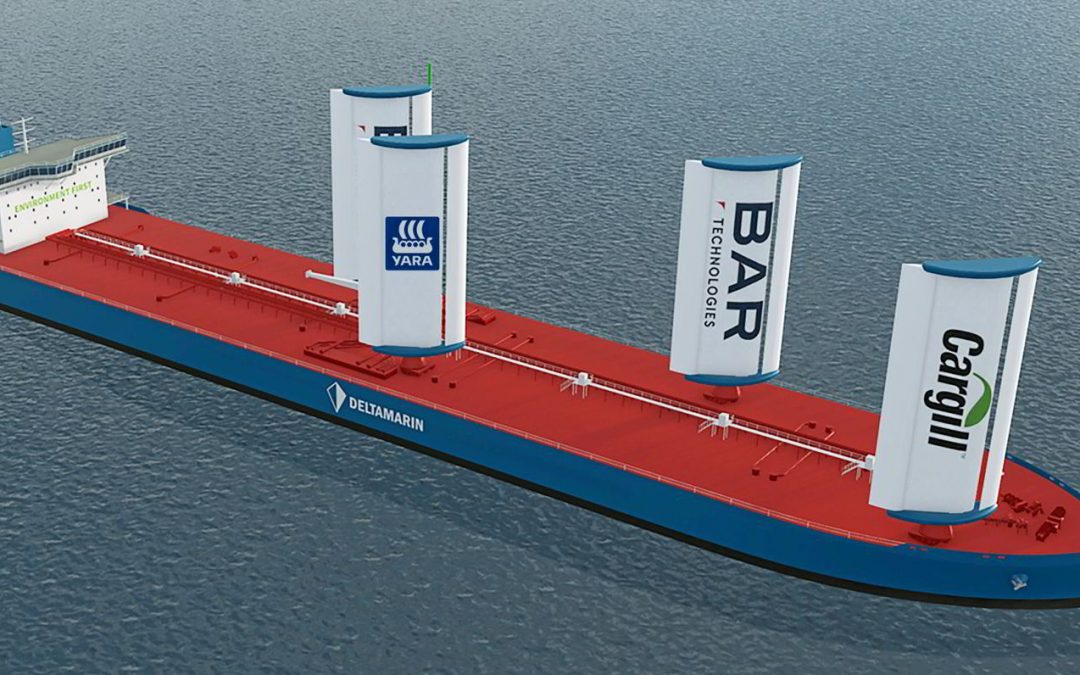A bulk carrier has been selected as the first ship to receive an advanced wind-assisted propulsion and route optimization system. The project, which includes Cargill, Mitsubishi Corporation, BAR Technologies, and Yara Marine Technologies, anticipates deploying the WindWings technology developed by BAR aboard the Mitsubishi-owned vessel chartered to Cargil by the beginning of 2023 and is seen as a demonstration of the of collaboration needed in the shipping industry to get the energy transition up to speed.
The installation will take place aboard the Singapore-flagged Pyxis Ocean, an 80,962DWT bulk carrier. The five-year-old vessel, which is 751 feet in length, will be fitted with two WindWings delivered by Yara Marine Technologies, which is the industrialization partner for the technology. Designed by the naval architects at BAR Technologies, which are leveraging their experience in developed world-class racing sailboats, the WindWings system combines dynamic multi-element wings and advanced route optimization to harness the power of the wind. They report that it will result in significantly improved fuel efficiency of up to 30 percent but will require no additional crew to operate the fully automated system.
“Windwings is a cutting-edge technology enabling the use of emission-free wind onboard of vessels,” said Thomas Koniordos, CEO of Yara Marine. “We are delighted to reach this major milestone in accelerating to the phase of delivering WindWings to vessels. Cargill and MC Shipping are companies dedicated to making bold moves to decarbonize and we are thrilled to be collaborating with them.”
The project to increase energy savings and reduce emissions from international shipping began in 2019 with the collaboration between Cargill and MC Shipping Singapore, the shipping arm of the Mitsubishi Corporation. Yara has been working with Cargill and in 2021 Yara and BAR reached an exclusive agreement to design and implement wind-assisted propulsion for the global shipping industry.
“Collaboration across the maritime supply chain is critical for the effective deployment of emissions reduction solutions,” commented Jan Dieleman, president of Cargill’s Ocean Transportation division. “Cargill and MC Shipping are working together to bridge the gap between shipowner and charterer, with a desire to implement technologies that will benefit not just both parties, but the industry and the planet at large.”
The European Union’s EU Horizon 2020 Project CHEK, dedicated to demonstrating solutions for decarbonizing international shipping is participating in the project by providing funding for one of the two wings to be fitted aboard the bulker. Designs for the wings, which will be mounted on the deck of the vessel but can be folded down, were approved by DNV with an Approval in Principle issued in 2021.
John Cooper, CEO of BAR Technologies, commented that “Cargill and MC Shipping’s WindWings installation demonstrates a step change in attitudes towards technologies as a means of enabling the energy transition for existing vessels. Reductions in fuel consumption via the exploitation of wind energy as a free fuel generates the two-fold benefits of lower fuel costs and lower emissions, propelling the global fleet affordably on its track to decarbonization.”
“The pressure is on the ship owning and chartering community to take proactive and material action to tackle the immediate and uprising challenges towards the energy transition on its existing vessels, and fast,” said Takafumi Oka, General Manager, Ship Dept. of Mitsubishi Corporation.
The partners believe the Pyxis Ocean is a good representation of the challenges the energy transition poses to the global fleet and will provide a model for the industry. They point out that 55 percent of the world’s bulker fleet is up to just nine years in age and that they represent just over half of all ships on the water today.
Source: The Maritime Executive






